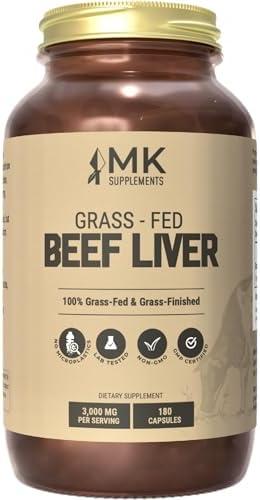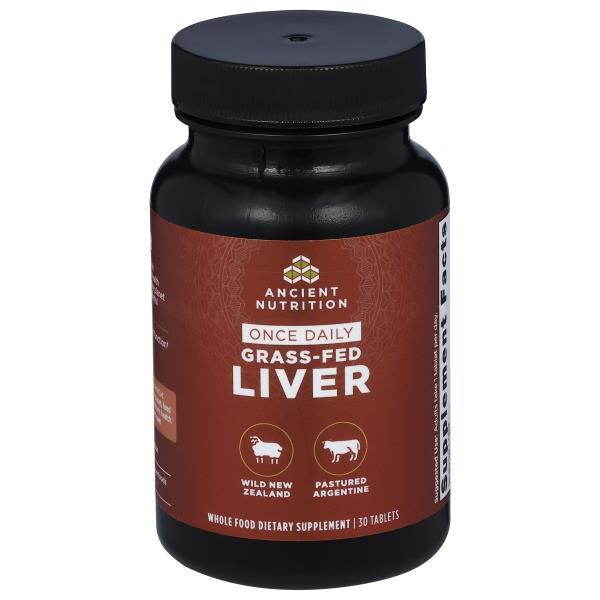In the kaleidoscopic world of nutrition, few topics evoke as much debate and curiosity as the consumption of organ meats, specifically beef liver. Revered by our ancestors as a superfood brimming with nutrients, beef liver has stood the test of time in various cultures, often regarded as a cornerstone of their diets. However, in the age of convenience and modern health trends, the customary practices surrounding this nutrient-dense organ are being met with contemporary alternatives—some advocating for synthesized supplements, while others champion the benefits of whole foods. In this exploration of beef liver supplements, we delve into the clash between ancestral nutrition wisdom and the allure of modern dietary innovations. Join us as we dissect the nutritional profile, benefits, and potential drawbacks of beef liver supplements, inviting you to consider how best to honor both time-tested traditions and cutting-edge practices in your quest for optimal health.
Exploring the Nutritional Legacy of Beef Liver in Ancestral Diets
The legacy of beef liver in ancestral diets serves as a compelling reminder of our nutritional roots. for millennia,cultures across the globe have revered liver as a superfood,rich in essential vitamins and minerals. notably, it boasts a high concentration of Vitamin A, B vitamins, notably B12, and essential minerals such as iron and copper. These nutrients play a pivotal role in supporting energy metabolism, maintaining cardiovascular health, and bolstering immune function. The traditional wisdom surrounding liver consumption suggests that it was frequently enough utilized not just for sustenance, but as a means of imparting strength and vitality, closely linking the organ’s consumption to the vibrancy of life in ancestral communities.
In contrast to modern dietary trends that frequently prioritize convenience and palatability, the nutritional composition of beef liver remains unparalleled. Contemporary alternatives, such as fortified foods or synthetic supplements, frequently enough fall short in delivering the complex array of bioavailable nutrients found naturally in liver. While today’s food landscape boasts a variety of options, it is crucial to recognize that none can replicate the unique synergy of nutrients present in beef liver. Below are some key nutritional benefits that highlight its importance in a balanced diet:
- High in iron: Promotes healthy red blood cell production.
- Loaded with Vitamin A: Essential for vision, skin health, and immune function.
- Rich in B Vitamins: Supports energy levels and cognitive function.
- Contains CoQ10: Beneficial for heart health.

Unpacking the modern Alternatives: Nutritional Claims and Efficacy
The growing popularity of modern alternatives to beef liver supplements has sparked significant interest in their claimed nutritional benefits and actual effectiveness. Unlike traditional beef liver, which has been celebrated for its high concentrations of essential nutrients, these alternatives frequently enough tout similar health benefits, but their efficacy varies widely. Many products on the market, such as desiccated organ supplements, aim to replicate the nutritional profile of beef liver. They often highlight benefits such as enhanced energy,improved muscle recovery,and better immune support. However, it’s important to note that the processing methods used for these supplements can affect nutrient bioavailability and the potential for absorption in the body.
When comparing these modern offerings, consumers should consider key factors such as ingredient sourcing, nutrient composition, and potential additives. Here’s a brief overview of common alternatives alongside their nutritional claims:
| Supplement | Nutritional Claims | Key Ingredients |
|---|---|---|
| Desiccated Liver Capsules | B12, Iron, Vitamin A | Beef liver sourced from grass-fed animals |
| Plant-Based Iron Supplements | energy Support, Immune Health | Spirulina, Alfalfa, Nutri-bloom blend |
| Vegan Nutritional Yeast | B Vitamins, Protein | Fortified with B12, organic ingredients |
As the supplement market continues to evolve, recognizing the differences in nutrient delivery and efficacy between traditional options and modern alternatives becomes crucial. It’s advisable to scrutinize labels for authenticity, recommended dosages, and efficacy studies that support the claims made. By understanding each option’s value,consumers can make informed choices that align with their health goals.

Comparative Analysis: Bioavailability and Absorption of Nutrients
When considering bioavailability and absorption of nutrients in beef liver supplements compared to modern alternatives, several key factors come into play.Beef liver is renowned for its dense concentration of vitamins and minerals, notably vitamin A, Vitamin B12, and iron, all in highly bioavailable forms. The nutrient composition of beef liver is naturally structured to maximize absorption; as an example:
- retinol (Vitamin A): Preformed and ready for immediate use by the body.
- Heme Iron: More efficiently absorbed than non-heme iron found in plant-based sources.
- B Vitamins: Present in a form that supports metabolic processes more effectively than synthetic versions.
In contrast, many modern supplements often rely on synthetic forms of these nutrients, which can differ considerably in their bioavailability.For example, while some contemporary supplements may claim to provide equivalent nutrient levels, the body may not absorb or utilize these synthesized versions as effectively as the natural forms present in beef liver.Consider the following comparison of absorption rates:
| Nutrient source | Bioavailability (%) |
|---|---|
| Beef Liver | 70-90% |
| Synthetic Vitamin A | 30-50% |
| Plant-based Iron | 2-20% |
This highlights the potential superiority of natural food sources, particularly in the context of ancestral nutrition, which prioritizes whole, minimally processed foods over synthesized supplements. As individuals seek to enhance their nutrient intake,understanding these differences can inform choices that align health benefits with dietary preferences.

Practical Recommendations: How to Integrate Beef Liver and Alternatives in Your Diet
Incorporating beef liver into your diet can seem daunting, but it can be quite straightforward with the right approach. Consider these practical tips to make the transition smoother:
- Gradual Introduction: Start with small, cooked portions to allow your palate to adjust.
- Pair with Familiar Flavors: Combine beef liver with spices or sauces you enjoy, such as garlic or mustard, to enhance its flavor.
- Use Minced or Ground Liver: Mix ground beef liver into meatballs, burgers, or stews, adding a nutritional boost without overwhelming taste.
- Explore Alternatives: If the taste of liver isn’t for you, consider products like desiccated liver capsules or liver pâté, which offer similar nutritional benefits in a more palatable form.
For those opting for alternatives,it’s essential to choose nutrient-dense options that align with your dietary goals.Here’s a brief comparison of beef liver and some popular alternatives:
| Food Item | Vitamin A (per 100g) | Iron Content (mg) | Protein (g) |
|---|---|---|---|
| Beef Liver | 16,500 IU | 6.2 | 26 |
| Chicken Liver | 11,000 IU | 9.0 | 25 |
| Beef Muscle Meat | 90 IU | 2.7 | 26 |
| Legumes (Cooked) | 0 IU | 3.0 | 9 |
These insights can help you explore ways to incorporate beef liver or its alternatives into your meals, ensuring that your diet remains balanced and nutrient-rich. Always remember to listen to your body and adjust your intake according to your personal preferences and dietary needs.
Key Takeaways
In exploring the nutritional landscape of beef liver supplements, we’ve traversed the ancient wisdom of ancestral diets and contrasted it with the contemporary alternatives that have emerged in our modern age. Both worlds offer unique insights into the pursuit of optimal health, revealing not only the rich tapestry of our dietary history but also the innovative solutions cultivated to meet today’s demands.
As we conclude this analysis, it becomes clear that the choice between ancestral nutrition and modern alternatives is not a matter of right or wrong, but rather a subjective journey tailored to individual needs and values. Whether you seek the time-honored benefits of beef liver in its most natural form or prefer the convenience of modern supplements, each option has its place in our varied nutritional narrative.
Ultimately, the path to wellness is as personal as it is diverse.We encourage readers to reflect on their own health journeys, consider the insights shared, and make informed decisions that resonate with their own lifestyles. After all, in the world of nutrition, knowledge is just as vital as the food we choose to nourish ourselves with.






